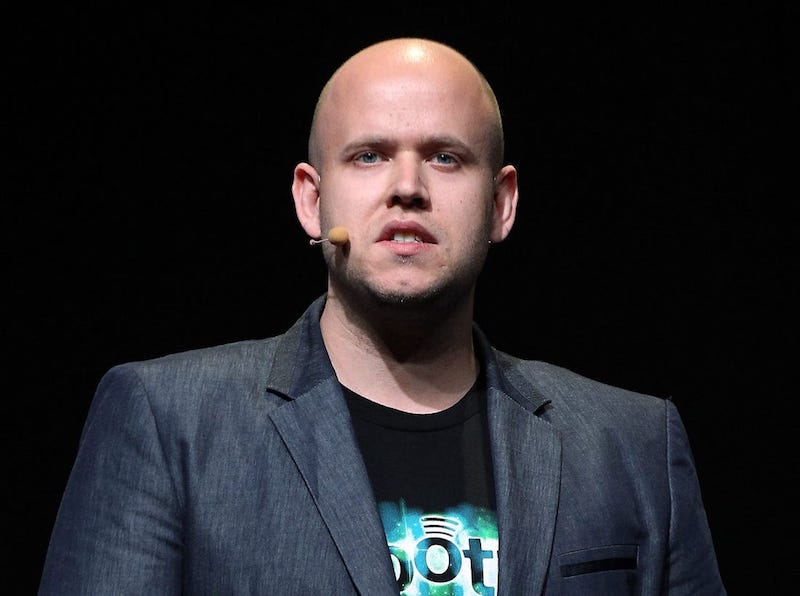How Spotify’s College-Dropout Founder Became A Self-Made Millionaire At 23 – And A Billionaire At 35
- Home
- How Spotify’s College-Dropout Founder Became A Self-Made Millionaire At 23 – And A Billionaire At 35

How Spotify’s College-Dropout Founder Became A Self-Made Millionaire At 23 – And A Billionaire At 35

Thirty-five-year-old Spotify co-founder and CEO Daniel Ek is the tech industry’s newest billionaire after the popular music streaming service went public on Tuesday in a massive direct listing, which valued the company at over $26 billion at the close of its first day of trading. Ek’s roughly 9 percent stake is worth nearly $2.5 billion.
But Ek is no stranger to making large sums of money at an early age. In fact, the Swedish-born founder became a self-made millionaire at only 23 years old, two years before he’d even launched the first Spotify application.
The enterprising Swede, who taught himself to write code in his early teens, actually started his first business at the age of 14. Riding the dot-com boom of the late 1990s, Ek had a side business designing and hosting websites for companies, often working out of his high school’s computer lab or his family’s home in the suburbs of Stockholm, according to Forbes.
Ek told Sarah Lacy in a 2013 interview that he started out designing website home pages for friends, but he was soon charging up to $5,000 to local companies, and he eventually made nearly $50,000 in just a month.
The Spotify CEO says even his parents didn’t know about his lucrative business until they noticed all of the video games and expensive guitars their son was collecting.
“I don’t think there was many 13‑year‑olds that had a 1957 Fender Stratocaster in original condition and things like that, but I did,” he told Lacy.
It was also around this time that Ek first began chatting online with future Napster founder and eventual Spotify investor Sean Parker. (Neither actually knew who the other was then — when they finally met in 2009, after Parker sent Ek a gushing email praising Spotify, the tech entrepreneurs realized that they’d spent hours talking under aliases in online chat rooms as teens.).
Even though Ek was earning more money than his mechanic father by the time he was 16, his bedroom-based business “was boring after a while,” he told Financial Times in 2013. He started hiring programmers and, by the age of 18, he was managing a team of 25 people. He was also forced to incorporate his growing business, he said, due to the fact that Swedish “tax authorities started asking questions about where all the money came from,” he told FT. At one point, the Swedish government contacted him “saying that I owe them a couple of hundred grand worth of taxes,” he told Lacy.
In 2002, Ek graduated from high school and, rather than continue to amass a large tax bill, he enrolled in Sweden’s Royal Institute of Technology to study engineering. However, Ek left the college after just eight weeks and he soon found work with a handful of tech companies, including a Swedish e-commerce site called Tradera that later sold to eBay. He also served as chief technology officer for Stardoll, a fashion-related online gaming company.
Ek eventually founded his own online marketing company, called Advertigo, which he sold to Swedish digital marketing firm TradeDoubler in 2006 for about $1.25 million.
He was just 23.
Ek initially took that windfall and “retired” from business, choosing instead to buy a luxe apartment in the middle of Stockholm along with a red Ferrari that he drove to nightclubs with his friends. But Ek told The New Yorker in 2014 that the lifestyle wound up making him “completely depressed.”
“I realized the girls I was with weren’t very nice people,” Ek told the magazine, “that they were just using me, and that my friends weren’t real friends. They were people who were there for the good times, but if it ever turned ugly they’d leave me in a heartbeat.”
While he’d amassed a small fortune at a young age, Ek said in 2014 that “no one teaches you what to do after you achieve financial independence.”
Ek quickly realized that the money did not matter to him as much as working on something he was passionate about. “I started thinking about what truly mattered to me, and I realized that there were two things in my life that had always been really impressive, which were music and technology,” he told Lacy.
That realization led Ek to his next big project: Later in 2006, he teamed up with Martin Lorentzon, the co-founder of TradeDoubler, to come up with the idea for Spotify. They used Napster as their inspiration, while seeking to avoid the legal issues around piracy by relying on streaming technology and securing licensing deals with record companies.
The streaming service officially launched to European users in October 2008 after Ek spent more than two years developing the service and convincing record labels and artists to have Spotify stream their music.
Difficulty in obtaining international licenses for music meant that Spotify couldn’t launch in the U.S. until 2011. From there, Spotify continued to face an array of obstacles to growth, including disputes with major record labels and with rivals like Apple as well as boycotts from musicians like Taylor Swift, who are critical of how much money Spotify’s streaming generates for recording artists.
Now, Spotify is ubiquitous and reaches nearly 160 million monthly users, including 71 million paid subscribers, according to the company’s latest tally. It pulled in roughly $5 billion in revenue in 2017 (while also losing more than $1.5 billion, thanks to the high cost of music royalties). Spotify is worth tens of billions of dollars, and Ek is far richer than he was when this week began.
Looking forward, Spotify is competing with rival tech giants like Apple and Amazon on the music streaming front, but Ek’s company currently claims 36 percent of the market’s streaming subscribers (far more than its rivals), and some analysts believe that Spotify could double its number of premium subscribers by 2020.
Ek also doesn’t really view Spotify going public as the culmination of the company’s growth, as the CEO said Spotify is still “in the early days” in an interview with CBS this week.
“We’re now a decade into that journey. And I really just feel like we’re in the second inning,” he said.
Source: cnbc.com
- Share
Classic Ghana
Classic Ghana brings you into a fun world of arts, entertainment, fashion, beauty, photography, culture and all things in between. Let’s explore these together!







